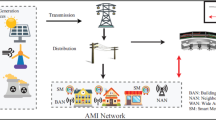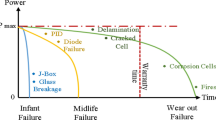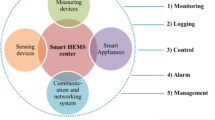Abstract
Flow against pipeline leakage and the pipe network sudden burst pipe to pipeline leakage flow for the application objects, an energy-efficient real-time scheduling scheme is designed extensively used in pipeline leak monitoring. The proposed scheme can adaptively adjust the network rate in real-time and reduce the cell loss rate, so that it can efficiently avoid the traffic congestion. The recent evolution of wireless sensor networks has yielded a demand to improve energy-efficient scheduling algorithms and energy-efficient medium access protocols. This paper proposes an energy-efficient real-time scheduling scheme that reduces power consumption and network errors on pipeline flux leak monitoring networks. The proposed scheme is based on a dynamic modulation scaling scheme which can scale the number of bits per symbol and a switching scheme which can swap the polling schedule between channels. Built on top of EDF scheduling policy, the proposed scheme enhances the power performance without violating the constraints of real-time streams. The simulation results show that the proposed scheme enhances fault-tolerance and reduces power consumption. Furthermore, that Network congestion avoidance strategy with an energy-efficient real-time scheduling scheme can efficiently improve the bandwidth utilization, TCP friendliness and reduce the packet drop rate in pipeline flux leak monitoring networks.
Similar content being viewed by others
References
Alenawy T A, Aydin H. Energy-aware task allocation for rate monotonic scheduling. In: IEEE Computer Society eds. 11th IEEE Real-Time and Embedded Technology and Applications Symposium. Washington: IEEE Press, 2005. 213–223
Adya A, Bahl P, Padhye J, et al. A multi-radio unification protocol for IEEE 802.11 wireless networks. In: San J, ed. First International Conference on Broadband Networks. California: IEEE Press, 2004. 344–354
Chereddi C, Kyasanur P, Vaidya N H. Design and implementation of a multi-channel multi-interface network. In: Vaidya N H, ed. International Symposium on Mobile Ad Hoc Networking and Computing. New York: ACM Press, 2006. 23–30
Dam T V, Langendoen K. An adaptive energy-efficient MAC protocol for wireless sensor networks. In: ACM Special Interest Group ed. ACM Sensys. California: ACM Press, 2003. 171–180
Du H, Hu X, Jia X. Energy-efficient routing and scheduling real-time data aggregation in WSNs. Comput Commun, 2006, 29(7): 3527–3535
Wong W K, Zhu H, Leung V C M. Soft QoS provisioning using the token bank fair queuing scheduling algorithm. In: Jamalipour A, ed. IEEE Wireless Communications. Sydney: IEEE Press, 2003. 8–16
Ren Q, Liang Q. Energy and quality aware query processing in wireless sensor database systems. Inf Sci, 2007, 177(10): 2188–2205
Qiao D, Choi S, Soomro A, et al. Energy-efficient PCF operation of IEEE 802.11a WLANs via transmit power control. Comput Netw, 2003, 42(1): 39–54
Rajendran V, Obraczka K, Garcia-Luna-Aceves J J. Energy-efficient, collision-free medium access control for wireless sensor networks. Wirel Netw, 2006, 12(1): 63–78
Ren Q, Liang Q. An energy-efficient MAC protocol for wireless sensor networks. In: Balasubramanian S, Elangovan I, eds. Proceedings of the IEEE Global Telecommunications Conference. Arlington: IEEE Press, 2005. 157–161
Zhang J, Zhang Q, Li B, et al. Energy efficient routing in mobile ad-hoc networks: mobility assisted case. IEEE Trans Vehicul Tech, 2006, 55(1): 369–379
Leu Y, Hung J. An energy efficient re-access scheme for data caching in data broadcast of a mobile computing environment. Inf Sci, 2007, 177(24): 5538–5557
Moser C, Brunelli D, Thiele L, et al. Real-time scheduling for energy harvesting sensor nodes. Real-Time Syst, 2007, 37(3): 233–260
Poonvasin S, Pathommanit N. Supporting heterogeneous traffic in wireless sensor networks. In: Salkintzis A K, Pavlidou F N, eds. International Symposium on Wireless Pervasive Computing. New York: Nova Science Publisher, 2006. 135–146
Schurgers C, Raghunathan V, Srivastava M B. Power management for energy-aware communication systems. ACM Trans Embed Comput Syst, 2003, 2(3): 431–447
Wang S Y, Hwang C C, Chou C L. On striping traffic over multiple IEEE 802.11(b) wireless channels. Wirel Netw, 2006, 12(3): 301–319
Author information
Authors and Affiliations
Corresponding author
Additional information
Supported by Xinjiang Production and Construction Corps Industrial Technology Research Plans (Grant No. 2007GG15), and the Tarim University Principal Youth Fund (Grant No. TDZKQN05002)
Rights and permissions
About this article
Cite this article
Zhou, P., Yao, J. & Pei, J. Implementation of an energy-efficient scheduling scheme based on pipeline flux leak monitoring networks. Sci. China Ser. F-Inf. Sci. 52, 1632–1639 (2009). https://doi.org/10.1007/s11432-009-0076-y
Received:
Accepted:
Published:
Issue Date:
DOI: https://doi.org/10.1007/s11432-009-0076-y




